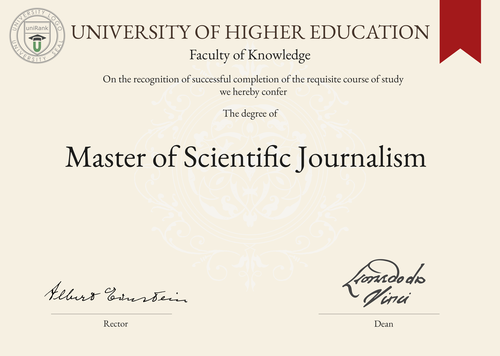
Master of Scientific Journalism (MScJ)
Guide to Master of Scientific Journalism Program/Course/Degree
Master of Scientific Journalism (MScJ)

Program Name
Master of Scientific JournalismProgram or Degree abbreviation
MScJDuration range
1-2 yearsTuition range
Varies depending on the country and university. Please check with specific institutions for accurate information.Overview
The Master of Scientific Journalism program is designed to provide students with the necessary skills and knowledge to effectively communicate scientific information to the public. This interdisciplinary program combines elements of journalism, science and communication to train students in the art of science reporting and storytelling.Curriculum Overview by year
Year 1: - Introduction to Scientific Journalism - Science Writing and Reporting - Multimedia Journalism for Science - Science Communication Ethics - Research Methods in Scientific Journalism Year 2: - Advanced Science Reporting - Data Journalism for Science - Science Documentary Production - Science Communication Strategies - Capstone ProjectKey Components
- Science writing and reporting skills - Multimedia journalism techniques - Understanding of scientific concepts and research methods - Ethical considerations in science communication - Data journalism and visualization skills - Science documentary productionCareer Prospects
Graduates of the Master of Scientific Journalism program can pursue various career paths in the field of science communication. They can work as science journalists, science writers, science communicators, media relations specialists for scientific organizations, or as producers of science documentaries. They may find employment in media outlets, research institutions, government agencies, or non-profit organizations.Salary Expectations
Salaries for professionals in scientific journalism can vary depending on factors such as experience, location and the specific job role. Entry-level positions may have salaries ranging from $30,000 to $50,000 per year, while experienced professionals can earn upwards of $80,000 per year. For a more accurate understanding of salary expectations, you can utilize the Job Sites Search Engine, from our sister site jobRank, which searches over 4,600 job sites worldwide. Make sure to specify not only the job title but also the country you are interested in.Conclusions:
It is important to note that the duration, tuition fees, curriculum, key components, career prospects and salary expectations of the Master of Scientific Journalism program can vary depending on the country or location where you choose to study, as well as the university you select. Therefore, it is recommended to research and compare different institutions to find the program that best fits your needs and goals. To explore where this specific degree (Master of Scientific Journalism) is offered anywhere in the world, you can use the uniRank World Universities Search Engine. This search engine allows you to find universities and programs based on your preferences and location.World Universities Search Engine
search for Master of Scientific Journalism (MScJ) and add the Location (country, state etc.) or specific University you are interested in studying at.
Query examples:
- Master of Scientific Journalism (MScJ) United States
- Master of Scientific Journalism (MScJ) United Kingdom online
- Master of Scientific Journalism (MScJ) Australia international students
- Master of Scientific Journalism (MScJ) University of California
- Master of Scientific Journalism (MScJ) University of London tuition fees
- Master of Scientific Journalism (MScJ) University of Sydney scholarships
Share Program/Course
Interesting? Share this program/course/degree info with your friends now.